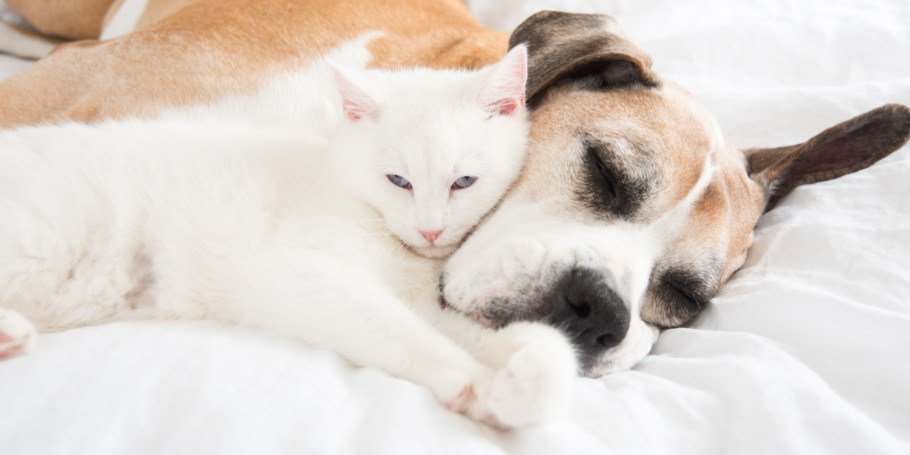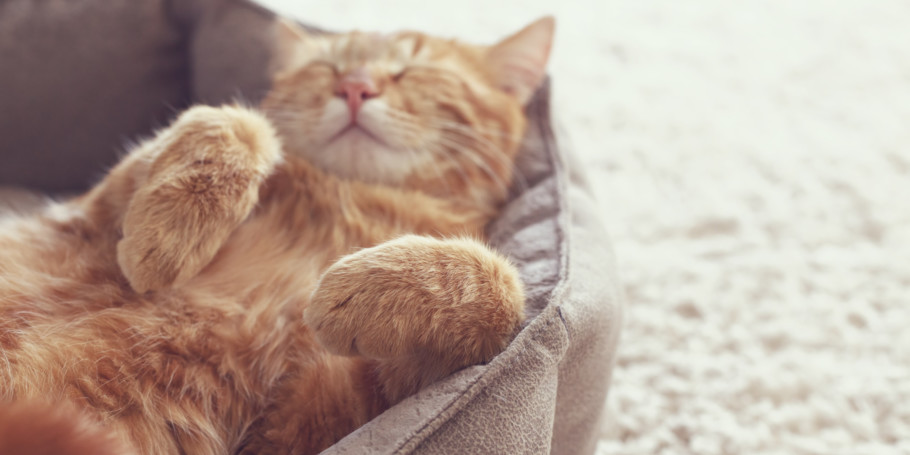Should We Let Our Pets Sleep In Our Bedroom?
19th July 2019
Slumber Centre
The relationship we have with our pet is a special one. Just what would our pets do without us? And more importantly, how an earth would we cope without them? It’s this unconditional love for our furry friends that makes spending time away from them so difficult. For some, this runs so deep that we can’t even bear to leave them alone for the night… But how is letting your cat or dog sleep in the same room (or even bed!) as you affecting your sleep quality and health?

Why do we sleep with our pets?
Those without pets are probably wondering why anyone would even considering sharing their sleeping space with an animal, no matter how domesticated we think they are. But the truth of the matter is we have been doing it for years. A recent study reported that Indigenous Australians would often sleep with their dogs for warmth during the colder months. Whilst there’s few people that would use this excuse now a days, pets do offer some owners a degree of comfort and reassurance so it’s unsurprising that more than half of pet owners let their pet come to sleep with them. Purely from a stress point of view, many pet owners feel more secure and relaxed when their cat or dog is sleeping nearby.
Having your dog or cat nearby also helps put pet owner’s minds at rest because they know their partner in crime isn’t up to no good in the middle of the night. Particularly if you’ve just welcomed a new young puppy or kitten to your family, it can be hard to leave them alone at night out of fear that they’ll be up wrecking the house or leaving you something to tidy up in the morning…
It’s not just for our benefit either. Many of us have busy work schedules and spend long periods of our day out of the house and away from our best friend. Some pets develop separation anxiety when they’re left alone for a long time, so letting them come to bed with us can help counter act that and make our pet feel more loved.

The impact on us
Perhaps the most obvious issue with letting our pets in the bedroom is that they aren’t necessarily the most hygienic of sleeping partners. A study by Animal Friends revealed that 43% of us are happy to share the bed with our cat or dog, but 30% of those that do, never wash their pet. The chances are you wouldn’t be particularly accommodating to your partner if they tried climbing into bed having not washed for weeks, so if you are one to let your pet into you bed, keeping them clean and washed will help keep your room smelling fresh and keep your sheets clean.
Fortunately for those of us who do share our bed with our furry friends, when it comes to actually falling asleep, it is more likely that your human sleeping partners will disrupt you than your pet. A study by the Mayo Clinic found that participants who allowed their pet to share their bed still maintained a sleep efficiency of 80%, indicating a satisfactory night’s sleep.

The impact on our pets
Research by Pet Owners Association has looked into the way sharing our bed with our pets can impact training and obedience. The study suggests that a well-trained dog will usually consider its owner as the pack leader, but by sharing a bed this status may be disrupted as both the dog and owner are placed on an equal playing field during sleep. This may leave your pet feeling confused and less likely to respond to training and discipline.
Alternatively, pets who sleep in their owner’s bed may also develop clingy behaviour. Such dysfunctional hyper attachment may result in your pet suffering from separation anxiety when you are not around. Signs to look out for in dogs include barking or howling when you leave, as well as pacing, panting and destructive behaviour when you’re not there.

The verdict
Every pet owner is different, but whether you’re happy to share your bed, or keep the bedroom a strictly no-pet zone, it is important to make sure your pet has a comfortable and suitable alternative, letting you rest assured you and your furry friend are getting your best night’s sleep.
